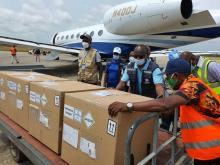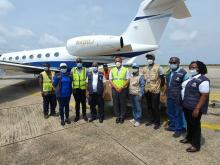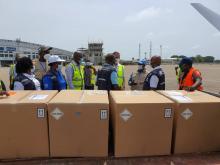Sierra Leone receives initial Ebola vaccine supply to bolster prevention
Freetown, 10 April 2021 – Sierra Leone today received the first batch of Ebola vaccines donated through the partnership between the World Health Organization (WHO) and the vaccine manufacturer Johnson & Johnson. A total of 30 000 regimen of the vaccines have been approved for Sierra Leone to protect people at high risk of the disease. Each regimen consists of two doses and would be given to the beneficiaries approximately eight weeks apart. The first consignment consists of 640 doses. Another consignment of 3 840 is expected to arrive in Freetown on 11 April. Subsequent consignments will be delivered during the period of the preventive vaccination.
The last Ebola outbreak in Sierra Leone was in 2016. Since then, no positive case of the disease has been confirmed in the country.
With the current outbreak of Ebola in neighbouring Guinea declared on 14 February 2021, Sierra Leone was placed under a priority-one country for Ebola preparedness based on the imminent risk of potential cross border transmission. Following the announcement of the outbreak and the imminent risk for Sierra Leone, the country activated its Health Emergency Preparedness and Response Systems to level 2 to enhance public health surveillance, active case finding and robust community engagement to prevent the spill over of the disease from the sister country, and ensure early case identification and effective response to manage any spill over and prevent spread into the community.
On 7 April, the Ministry of Health and Sanitation launched a comprehensive six months Ebola Outbreak Preparedness and Contingency Plan to guide the country’s heightened preparedness activities. The vaccine delivery and the planned vaccination of a selected target groups is one of the strategic priority interventions that are being undertaken in Sierra Leone to protect those at high risk of contracting the disease should there be a spill over into the country.
“Despite the threat of Ebola outbreak and the multiple public health emergencies we are currently dealing with, there is greater hope and confidence in the improved capacities that Sierra Leone has built over the years to prevent these outbreaks and to promptly bring cases under control if they ever occur,” said Dr Steven Velabo Shongwe, WHO Representative in Sierra Leone. “Our hope is also based on the great scientific developments and progress made over the past five years for the prevention and management of Ebola cases in terms of advances in Ebola vaccines, and therapeutics to treat confirmed Ebola patients. WHO will continue to collaborate with partners to harness and to provide technical support to Sierra Leone to save lives and protect the population from unnecessary deaths and negative socio-economic impact as was the case during the 2014–2016 Ebola outbreak that paralysed the country”.
Between 10 and 11 April 2021, a total of 4480 doses of the vaccines would have been delivered to health authorities in Sierra Leone. By the end of August 2021, a total of 30 000 regimen (60 000 doses) would have been delivered in Sierra Leone to vaccinate those at highest risk of contracting Ebola disease in the event of a spill over from the current outbreak in Guinea, thanks to the partnership between WHO, Johnson and Johnson and the Government of Sierra Leone.
The Ebola vaccine were mobilized by WHO from its headquarters in Geneva in partnership with the producer Johnson & Johnson.
Sierra Leone is working closely with neighbouring countries and regional and international organizations to strengthen collaboration in the fight against the disease. In March, the Ministers of Health from the neighbouring countries agreed on a common approach to improve coordination and cross-border collaboration to stamp out the outbreak in Guinea and prevent cross-border transmission.
The country’s effort to scale up its national emergency readiness capabilities is strongly supported by WHO, US Centers for Disease Control and Prevention, alongside other partners to build the required capacities for prevention and response, while continuing to monitor the situation in Guinea.
Media contact
WHO country/regional office
Saffea Gborie, +232-76 777878, gboriesa [at] who.int (gboriesa[at]who[dot]int)
Sakuya Oka, +242 06 508 1009, okas [at] who.int (okas[at]who[dot]int)





